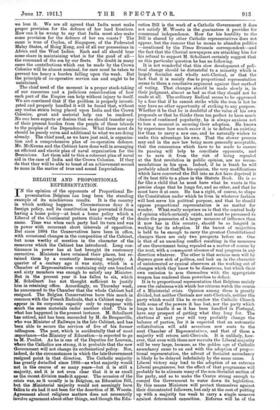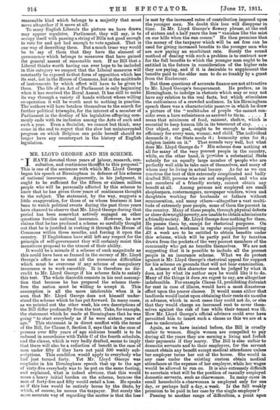BELGIUM AND PROPORTIONAL REPRESENTATION.
TN the opinion of the opponents of Proportional Re- I_ presentation Belgium has long been the standing example of its mischievous results. It is the country in which nothing happens. Circumstances deny it a foreign policy, and its constitution has prevented it from having a home policy—at least a home policy which a Liberal of the Continental pattern thinks worthy of the name. Time was when each party had its turn and was in power with recurrent short intervals of opposition. But since 1884 the Conservatives have been in office, with occasional changes in the composition of the Cabinet, but none worthy of mention in the character of the measures which the Cabinet has introduced. Long con- tinuance in power has at last brought its customary corrective. Ministers have retained their places, but re- tained them by a constantly lessening majority. A quarter of a century ago it was sixty, which in a Chamber of Representatives containing only one hundred. and sixty members was enough to satisfy any Minister. But in the present year it has fallen to six, which M. Schollaert has not thought sufficient to justify him in retaining office. Accordingly, on Thursday week, he announced to the Chamber that the whole Cabinet had resigned. The Belgian Conservatives have this much in common with the French Radicals, that a Cabinet may dis- appear in its corporate capacity only to reappear with much the same materials under another chief. This is what has happened in the present instance. M. Schollaert has retired, and has been succeeded by M. de Broqueville, who was Minister of Railways in the late Cabinet, and has been able to secure the services of five of his former ,...olleagues. The post, which is accidentally that of most anportance—the Ministry of Education—is expected to go to M. Pouliot. As he is one of the Deputies for Louvain, Where the Catholics are strong, it is probable that the new Government will not change its ecclesiastical policy. Nor, indeed, do the circumstances in which the late Government resigned point in that direction. The Catholic majority has greatly dwindled since 1886—as what majority would not in the course of so many years—but it is still a majority, and it is not even clear that it is as small as the recent division made it appear. The occasion of the crisis was, as it usually is in Belgium, an Education Bill, but the Ministerial majority would not seemingly have fallen to six had it not been for the desertion of M. Woeste. Agreement about religious matters does not necessarily involve agreement about other things, and though the Edu- cation Bill is the work of a Catholic Government it does not satisfy M. Woeste in, the guarantees it provides for communal independence. How far his hostility to the Bill is shared by other Catholic representatives does not appear, but the rumour that he means to abandon politics —mentioned by the Times Brussels correspondent—and the fact that the Clerical newspapers are attacking him for his refusal to support M. Sehellned certainly suggest that on this particular question he has no following. It is not wonderful that this slow development of poli- tical change should be distasteful to a minority which is largely Socialist and wholly anti-Clerical, or that the fact that it is mainly due to proportional representation. seems to them a conclusive argument against that method of voting. That changes should be made slowly is, in their judgment, almost as bad as that they should not be made at all. The ordinary Radical seems to be oppressed by a fear that if he cannot strike while the iron is hot he may have no other opportunity of striking to any purpose. Whether it be that he is doubtful of the value of his own proposals or that he thinks them too perfect to have much chance of continued popularity, he is always anxious not to lose a moment in securing their adoption. He knows by experience how much easier it is to defend an existing law than to earry a new one, and he naturally wishes to make this advantage his own. That the slower process may end in the new law being more generally acceptable, that the concessions which have to be made to ensure its passing will help to conciliate opponents, and so to save it from the risk of being repealed at the first revolution in public opinion, are no recom- mendations in his eyes. Indeed, if he is frank he will probably admit thann his opinion, the very modifications which have converted the Bill into an Act have deprived it of its best title to a place in the Statute Book. He is so far like a child that he must have what he wants in the precise shape that he longs for, and no other, and that he must have it at once. He has a right, of course, to shape the Constitution under which he lives in whatever fashion will best serve his political purpose, and that he should oppose proportional representation is no matter for wonder. What really surprises us is that the central body cf opinion which certainly exists, and must be presumed to desire the possession of a larger measure of influence than it now has in this country, should be so languid in working for its adoption. If the barest of majorities is held to be enough to carry the greatest Constitutional changes there are only two prospects before us. One is that of an unending conflict resulting in the measures of one Government being repealed as a matter of course by the next, with a consequent absence of real progress in any direction whatever. The other is that serious men will by degrees grow sick of politics, and look on in the character of uninterested or cynical observers at the working out of changes which they know to be disastrous, but which their own omission to arm themselves with the appropriate weapon has rendered them powerless to defeat. It is to proportional representation that Belgium mainly owes the calmness with which her citizens_watch the course of a Ministerial crisis. Opinion among them is greatly divided, but neither Clericals nor anti-Clericals, neither the party which would like to re-endow the Catholic Church with some of the powers it has lost, nor the party which longs to handle it as it has been handled in Portugal, have any prospect of getting what they long for. The elections of next year will very probably change the balance of parties, for it is expected that an automatic redistribution will add seventeen new seats to the next Chamber of Representatives, and that of these a majority will return anti-Clericals. It is unlikely, how- ever, that even with these new recruits the Liberal majority will be very large, because, as the golden age of Catholic ascendancy came to an end with the adoption of propor- tional representation, the advent of Socialist ascendancy is likely to be delayed indefinitely by the same cause. Liberal victory may lead to the adoption of an extreme Liberal programme, but the effect of that programme will probably be to alienate many of the non-Socialist section of the party, and so to make the Centre strong enough to compel the Government to water down its legislation. By this means Ministers will protect themselves against their discontented. followers, but only at the cost of putting up with a majority too weak to carry a single measure against determined mmosition. • Reforms will be of the reasonable kind which belongs to a majority that must move altogether if it move at all. To many English Liberals the picture we have drawn may appear repulsive. Parliament, they will say, is to occupy itself with passing a string of Bills not good enough to vote for and not bad enough to vote against. That is one way of describing them. But a much truer way would be to say of them that they have the element of permanence which belongs to measures that have gained the general assent of reasonable men. If no Bill that a Liberal thinks worth having can ever hope to be included in this category we suspect that the Liberal measures will constantly be exposed to that form of opposition which has its seat, not in the House of Commons, but in the multitude of instruments by which effect will have to be given to them. The life of an Act of Parliament is only beginning when it has received the Royal Assent. It has still to make its way through a variety of hands without whose willing co-operation it will be worth next to nothing in practice. The authors will have betaken themselves to the search for further political triumphs, for the interest of a member of Parliament in the destiny of his legislative offspring com- monly ends with its inclusion among the Acts of such and such a year. Even a Socialist, we cannot but think, may come in the end to regret that the slow but uninterrupted progress on which Belgium can pride herself should no longer have any counterpart in the history of English legislation.











































 Previous page
Previous page